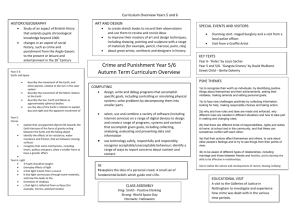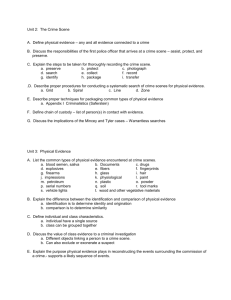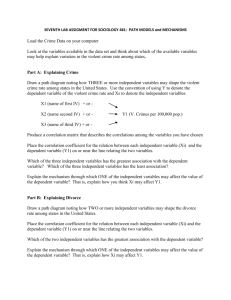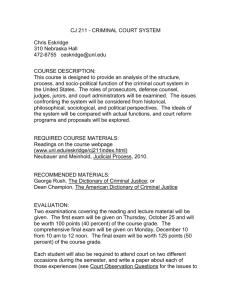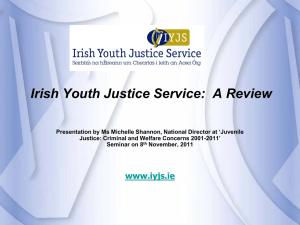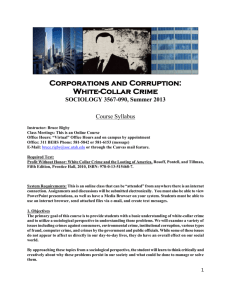CJ 477 Syllabus - University of Nebraska–Lincoln
advertisement
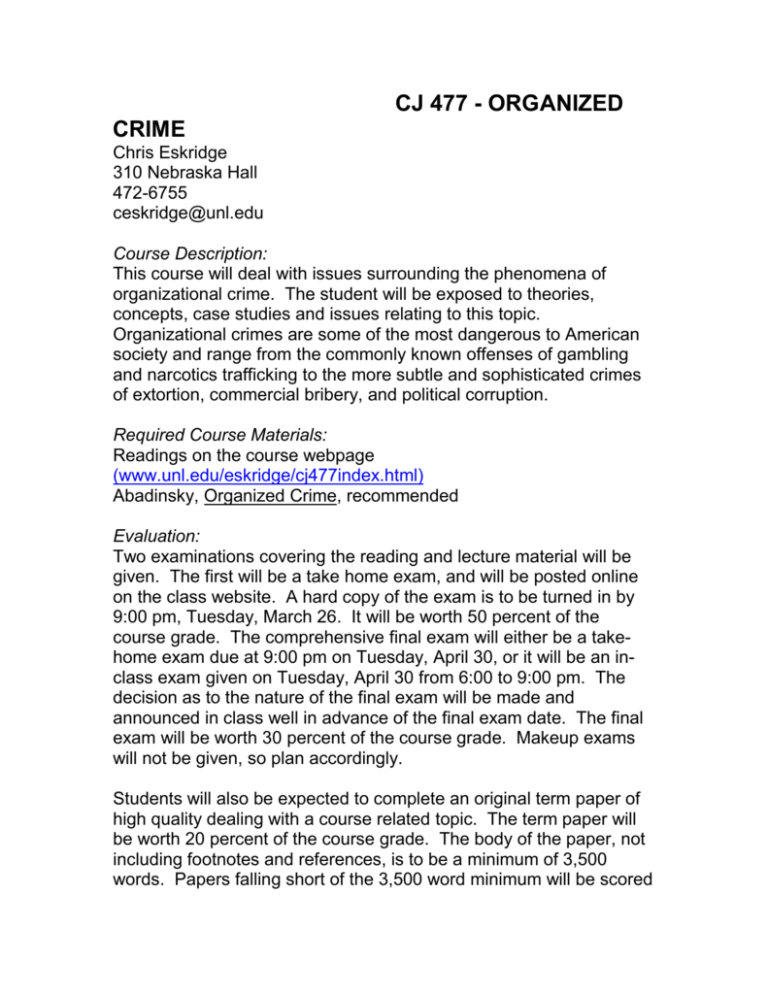
CJ 477 - ORGANIZED CRIME Chris Eskridge 310 Nebraska Hall 472-6755 ceskridge@unl.edu Course Description: This course will deal with issues surrounding the phenomena of organizational crime. The student will be exposed to theories, concepts, case studies and issues relating to this topic. Organizational crimes are some of the most dangerous to American society and range from the commonly known offenses of gambling and narcotics trafficking to the more subtle and sophisticated crimes of extortion, commercial bribery, and political corruption. Required Course Materials: Readings on the course webpage (www.unl.edu/eskridge/cj477index.html) Abadinsky, Organized Crime, recommended Evaluation: Two examinations covering the reading and lecture material will be given. The first will be a take home exam, and will be posted online on the class website. A hard copy of the exam is to be turned in by 9:00 pm, Tuesday, March 26. It will be worth 50 percent of the course grade. The comprehensive final exam will either be a takehome exam due at 9:00 pm on Tuesday, April 30, or it will be an inclass exam given on Tuesday, April 30 from 6:00 to 9:00 pm. The decision as to the nature of the final exam will be made and announced in class well in advance of the final exam date. The final exam will be worth 30 percent of the course grade. Makeup exams will not be given, so plan accordingly. Students will also be expected to complete an original term paper of high quality dealing with a course related topic. The term paper will be worth 20 percent of the course grade. The body of the paper, not including footnotes and references, is to be a minimum of 3,500 words. Papers falling short of the 3,500 word minimum will be scored on a percentage basis (note the word count at the end of the paper narrative). Those wishing comments on early drafts need to submit their 'work-in-progress' by April 2. Completed papers are due no later than 9:00 pm, April 16. No papers will be accepted after that date. Course Grade: A standard "curve" will be used to determine the course grade (90%A; 80%-B; 70%-C; 60%-D). A passing grade is a C on the P/N option. Attendance will not be taken, but students should plan on attending class on a regular basis in as much as the exams will emphasize material presented in class. Students who miss a class session should make arrangements to obtain notes from another class member. Exam Content: Mid-Term Exam Final Exam Text Material Abadinsky 1-12; Xerox materials Webpage materials Lecture Material Sections 1-8 Abadinsky 1-15; Xerox materials Webpage materials Sections 1-14 Students with Disabilities: The University of Nebraska-Lincoln provides individualized accommodations to students with documented disabilities. If you have a documented disability that is impacting your academic progress, please call SSD at 472-3787 and schedule an appointment with the Director, Veva Cheney, or Assistant Director, Barbara Woodhead. If you do not have a documented disability but you are having difficulties with your coursework (such as receiving low grades even though you study more than your classmates or running out of time for test questions when the majority of your peers finish their exams in the allotted time), you may schedule an appointment with Veva or Barbara to discuss the challenges you are experiencing. COURSE OUTLINE TOPIC READINGS SECTION 1 TEXT Introduction to Organized Crime SECTION 2 1 Definitions of Organizational Crime Abadinsky SECTION 3 3-5 History and Structure of Traditional OC Abadinsky SECTION 4 3-7 Case Studies Abadinsky SECTION 5 6-10 Non-Traditional Organizational Crime Abadinsky SECTION 6 11 Gambling Abadinsky SECTION 7 11 Prostitution/Human Trafficking Abadinsky SECTION 8 12, 13 Racketeering Abadinsky SECTION 9 13 Money Laundering Abadinsky -MID TERM EXAM - SECTION 10 Drugs 13 Abadinsky SECTION 11 Business and Organizational Crime 13 Abadinsky SECTION 12 Governmental Corruption SECTION 13 RICO and Other Enforcement Tactics 14-15 Abadinsky SECTION 14 Legal and Social Reforms 15 Abadinsky - FINAL EXAM - The reading assignments are noted in the right hand column. Students are encouraged to read ahead so that they might be somewhat familiar with the course material prior to its presentation in class. It should be noted, however, that the exams will focus on material presented in class.



